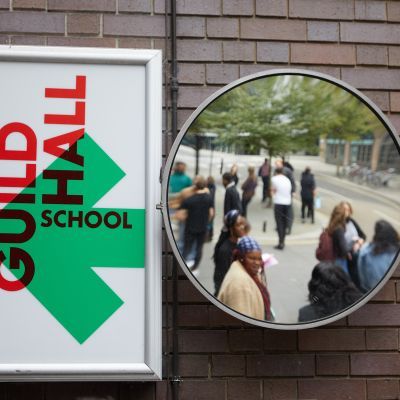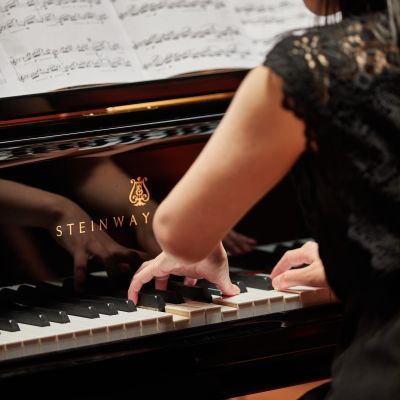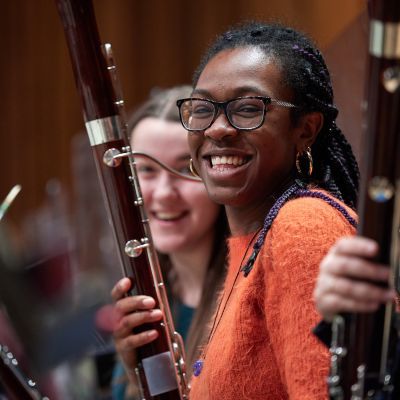
Breadcrumb navigation
Music Therapy Auditions
Application deadlines:
Asia venues: Thursday 2 October 2025
New York venue: Tuesday 2 December 2025
London venue: Wednesday 10 December 2025
Recorded audition: Wednesday 10 December 2025
Music Therapy Auditions
All applicants who apply for a live audition in London will be offered an in-person audition. However, the majority of successful applications come from musicians who have completed their bachelor degree and/or who have gained significant relevant work and life experience outside of education.
Application process
- Submit an online application by 4.30pm on the deadline date appropriate for the venue you choose for your initial audition.
- All applicants who elect to audition in person will be offered an initial musical skills audition. Further information about auditions can be found below.
- Applicants who are successful at audition will be invited to the interview stage of the process. Further information about the interview process can be found below.
*Note: if you are applying to attend a live audition in one of our Asia or New York audition venues, earlier application deadlines apply. Please see the relevant section below for further information.
Application form
Please ensure that you state exactly which first study and second study disciplines you will present at audition in the relevant fields, along with a note about whether you require a classical accompanist (see notes below about accompaniment the school can provide under the ‘accompaniment and equipment’ section*).
Examples are below:
- Classical clarinet (require a classical accompanist)
- Classical viola (no accompanist required – solo repertoire)
- Jazz saxophone (will bring own playback equipment and backing track)
- Popular guitar (will bring own playback equipment and backing track)
- Musical theatre/popular voice (will accompany self on piano)
Personal statement questions
As part of your application, you will be asked to respond to three key questions in place of the traditional personal statement. These questions are designed to give you the opportunity to reflect on your motivations, experiences, and preparation for study at Guildhall. Each question is equally important and no question carries more weight than another. Full details about these questions can be found on the application guidance page, under the Personal Statement heading.
You should ensure that your responses best reflect the qualities which make you a suitable applicant for the programme. We welcome applicants from different backgrounds and at different stages in their lives, with diverse personal, musical educational and work experiences. We are looking for applicants who are creative, engaged and thoughtful, and curious about their own and others’ experiences.
Your responses should also detail your relevant experience to date, motivations for using music to work with vulnerable people within a therapeutic framework, and your wish to train in music therapy as a professional discipline. Prior experience of personal therapy is an advantage.
Referees
You must also ensure that you supply contact details for two referees who can comment on your suitability for this pathway. Both references must be submitted within two weeks of your application date.
Musical Audition
Application deadline: Wednesday 10 December 2025
London auditions are provisionally scheduled to take place on the following dates:
- Monday 26 January 2026
- Thursday 29 January 2026
- Friday 30 January 2026
- Thursday 5 February 2026
- Monday 9 February 2026
We may also use Monday 2 February 2026 and Friday 6 February 2026, depending on the number of applications we receive.
Please note: these dates are subject to change and cannot be guaranteed. You will be advised of your audition date after the application deadline and should not book travel/accommodation prior to formal confirmation of your appointment.
At the live audition, you are expected to demonstrate a high standard in your first instrument (usually diploma/degree level or performance skill at a professional/commercial level). We are particularly interested in sensitive and expressive musical communication and the potential to develop improvisational skills, alongside technical skill.
Your keyboard skills will also be tested. Second study and keyboard skills should be of minimum grade 5 standard or equivalent. The unseen audition tasks do not require reading Western staff notation, but applicants are expected to have some familiarity with treble and bass clef notation as it may be used in some teaching contexts.
Accompaniment and equipment
*PLEASE NOTE: We will supply a staff accompanist for your audition (if appropriate for your chosen instrument/s) and they will be prepared to accompany music from the western classical tradition. If you are presenting a piece which does not have western classical notation, you must supply your own accompanist or a backing track (and a suitable device for playing the track). In either case, please email music_applications@gsmd.ac.uk at the point of application to confirm any such arrangements.
Please email before your audition if:
- You will be accompanying yourself or bringing someone to accompany you
- You are playing something from outside the western classical tradition for which you require alternative accompaniment arrangements (as detailed above)
- You require additional musical equipment (e.g. electric guitar amplifier, drum kit etc.)
- You require use of a Guildhall School instrument or special audition room setup, e.g. harp/percussion/harpsichord etc.
PLEASE NOTE: We recommend you bring your own equipment wherever possible as we cannot guarantee to meet all requests. Please email music_applications@gsmd.ac.uk if you fall into any of the above categories.
You will need to prepare:
(i) two contrasting pieces on your first study instrument. These should be drawn from your main musical speciality, for example classical, jazz, or folk repertoire, or music from any other tradition or style.
(ii) one piece on your second study instrument - this may be drawn from the same musical speciality or another specialty.
(iii) a short, simple song for unaccompanied voice, such as a folk song or children’s song (ideally from memory)
Unseen - presented to you at the audition:
(iv) Melodic aural test:
Candidates will be asked to play back phrases of a given melody on their chosen instrument (not voice). The key and starting note will be given.
(v) Harmonic accompaniment
Candidates will be asked to provide a simple introduction and harmonic accompaniment to a familiar song sung by a panel member. This can be on keyboard, guitar or any other harmonic instrument. The key will be given.
(vi) Free Improvisation
Candidates will be asked to freely improvise on piano in response to a given story line or scenario. This does not require accomplished pianistic skills, but more imagination and creativity in making sounds to reflect the events and emotions suggested by the story or scenario.
(vii) Role play exercise
Candidates will be asked to engage in an interactive improvised musical role-play with a member of the panel, resembling a music therapy session. This can be on any instrument including voice, and percussion provided by the panel. The panel member will give a brief description of the imagined setting and the age/needs of the music therapy patient they are role-playing.
Overseas Applicants
Candidates located overseas may either:
- submit a recorded audition for initial consideration; or
- attend a live audition in one of our overseas venues (in Asia or New York), as detailed here: Music Auditions Overseas | Guildhall School of Music & Drama (gsmd.ac.uk)
Please note the earlier application deadlines for our Asia and New York venues, as detailed below.
Application deadline: Wednesday 10 December 2025
If you wish to submit an initial recorded audition for consideration, please note the following:
- Please ensure that you select ‘RECORDED’ in the audition venue field of the application form.
- Instructions about how to upload your video will be sent to you after the application closing date.
- The deadline for all uploaded audition videos is Friday 2 January 2026.
- If you are successful following your initial recorded submission, you must be prepared to travel to London for a live audition/interview which is scheduled to take place in March/April 2026.
Please prepare video recording(s) of the following items:
(i) two contrasting pieces on your first study instrument. These should be drawn from your main musical speciality, for instance classical repertoire, jazz repertoire, or folk repertoire from any tradition.
(ii) one piece on your second study instrument - this may be drawn from the same musical speciality or another specialty.
(iii) a short, simple song for unaccompanied voice, such as a folk song or children’s song (ideally from memory).
PLEASE NOTE: If you are successful following your initial recorded submission, you must be prepared to travel to London for a live audition/interview which is scheduled to take place in March/April 2026. You will be asked to complete the unseen aspects of the audition process, as detailed above, and the panel may also wish to hear you play some of your pieces. This will be communicated to you when you are invited. Details about the interview day are below.
Please note: if you wish to apply for an audition in Asia or New York, you must apply by the stated deadlines for those venues, which are as follows:
- Asia Venues: Thursday 2 October 2025
- New York Venue: Tuesday 2 December 2025
PLEASE NOTE: we cannot supply an accompanist for overseas auditions - you must supply your own accompanist or a suitable backing track (and a suitable device for playing the track).
Candidates should prepare for live auditions as detailed under the 'Audition Format' heading above. Please note that for the unseen tasks, candidates will be required to use the piano (no guitar will be available).
If successful in your live overseas audition, you must be prepared to travel to London for a live audition/interview which is scheduled to take place in March/April 2026.
On the London interview day, you may be asked to repeat some of the unseen aspects of the audition process, as detailed above, and the panel may also wish to hear you play some of your pieces. This will be communicated to you when you are invited. Details about the interview day are below.
Interviews
Interviews take place in London in March/April.
The interview day is divided into three parts; two interviews and a group session. The interviews will be conducted with:
1) the Head of Music Therapy, and
2) a qualified, experienced psychotherapist, external to the music therapy programme, who helps to assess your personal readiness to undertake training.
Occasionally, further interviews with the Head of Music Therapy are deemed necessary before making a final decision.
In these interviews, you will discuss your musical and family background, significant events in your life or aspects of your development, your motivation to work as a therapist, your mental and physical health, your background reading, and your observation of music therapy or voluntary work in relevant areas. Importance is placed on your perception of the personal qualities needed to undertake a psychodynamic training to work as a therapist, including the capacity for personal self-reflection and the ability to communicate openly about your thoughts and emotions. Emphasis is placed on the ability to think independently and creatively, and the ability to reflect on and discuss challenging life experiences.
3) You will also participate in an experiential music group session with other applicants, run by one of the department’s tutors. In this session we will assess how you relate musically and verbally within a group setting.
English Language Requirements
As the programme requires extensive reading and private study, as well as placements in professional workplaces, there should be evidence of intellectual stamina and a sound working knowledge of English. Please check the English language requirements for this course before application.
Disclosure and Barring Service (DBS) Check and Health Requirements
All successful candidates will be subject to a Disclosure and Barring Service and health check.
We require candidates to supply a full immunisation history post-offer. This information is required by some clinical placements in order to protect potentially vulnerable members of the community. They may also require evidence of Covid-19 vaccination status. The placement provider may request that you obtain additional vaccinations prior to undertaking any observation/work, if you are not deemed sufficiently protected.

